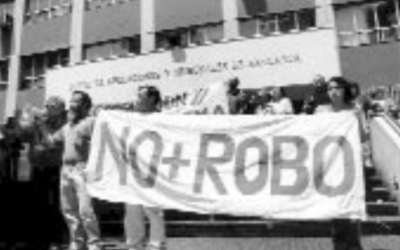Freedom in Code
The Birth of the Chilean Free Software Movement
In January 2004, Congressman Alejandro Navarro Brain announced his intention to introduce Chile’s first piece of legislation requiring the use of free software in all branches of public administration. For Navarro Brain, a socialist publicly committed to issues such as indigenous rights and environmentalism, free software serves as yet another extension of his progressive platform for social and economic justice. The legislation, tentatively titled “Proyecto de Ley: Software Libre,” argues that viewing, altering, and freely disseminating the software code underlying many state operations is fundamental to Chilean national security, public participation in government, and control over national destiny. Proprietary software vendors, such as Microsoft, currently prohibit these actions. Even in its preliminary form, Navarro Brain’s proposal is significant. Chile, the Latin American nation most popularly viewed as a testament to unrestrained private sector growth, has entered into the expanding fold of developing world countries taking a stand against Microsoft.
As a doctoral student studying how state ideologies have historically shaped computer use in Chile, I’ve often wondered why Chile, one of the most “wired” countries in Latin America, had abstained from the ideological debate over software alternatives that have preoccupied their neighbors. Other Latin American nations, particularly Peru, Argentina, and Brazil, have assumed a place of importance in the free software movement, serving as models for grass roots organization against Microsoft and as potential hotbeds for future development. The acronym applied to the technology, FLOSS (Free/Libre Open Source Software), further illustrates the current influence of the Spanish-speaking world. In 2001, Peru attracted world attention as one of the first countries to push a piece of legislation mandating the use of free software in government, which stalled following a well-timed visit to Lima by Microsoft President Bill Gates.
The concept of “free software” is nothing new. The idea originated 20 years ago when MIT programmer Richard Stallman drafted a manifesto criticizing software companies for denying programmers the right to access and modify the software they purchased. The manifesto served as a rallying cry to programmers everywhere, urging them to protect their rights by adopting a new model of software development in which programs would maintain their integrity by remaining open to user scrutiny, modification, and distribution. The Linux Operating System and the Open Office Suite (an open source equivalent of Microsoft Office) are but a few examples of the products that have evolved in the wake of Stallman’s mandate.
In recent years, the free software movement has extended beyond select groups of programmers and gained a following among politicians and government administrators, particularly those representing countries in the developing world. The movement provides an opportunity for poorer countries to create software applications tailored to their needs, which they can maintain and upgrade themselves. It may also help sever longstanding relations of economic dependency that have trapped developing nations in the purchase of imported technologies from more technologically advanced parts of the world. Software, a technology most view as politically neutral, actually exerts power. The label “free software” does not necessarily imply economic philanthropy, but rather the conviction that software developed using this model would ensure the freedom to view, modify and share program code openly. To date, Microsoft’s near monopoly in the software market has obligated many developing countries to design their information systems using Microsoft products, obliging them to purchase costly upgrades and technical service. Many believe free software provides an opportunity to escape this holding pattern.
Chile, however, has remained noticeably absent from these conversations. Absent, that is, until now. During my most recent visit to Chile in January 2004, I decided to speak with several of the actors involved with this technology in hopes of discerning how this emerging debate over software alternatives will take form in Chile’s distinctive neo-liberal landscape.
BUILDING A MOVEMENT
I met with Eric Baez over a beer at an outdoor café in Santiago’s bohemian comuna of Nuñoa. Baez, a journalism graduate, has dedicated the past few years of his life to fomenting public interest in the free software movement. Besides running the major Chilean website dedicated to the dissemination of free software related news www.softwarelibre.cl, he is also collaborating with Navarro Brain in drafting the recent legislative proposal.
Grass roots activism has played a key role in furthering the adoption of free software within other Latin American countries, but Chile has proven remarkably resistant to the message of free software advocates. Baez believes the causes are multiple. The 16-year military dictatorship under General Augusto Pinochet destroyed the majority of Chilean outlets for popular participation during the 1970s and 1980s. Moreover, Chile’s neo-liberal economy, which has only grown stronger following Chile’s return to democracy in 1989, has reinforced ideals of individualism instead of collective good. The result, Baez explains, is that Chileans lack experience in self-organization and express a general acceptance of the status quo. Organizations such as the newly formed “Centro de Diffusión de Software Libre”, composed of a mixed bag of activists, educators, and programmers, are trying to correct this by running seminars on strategy and leadership skills in addition to promoting the advantages of free software adoption. “People in general do not think from the perspective of social change,” Baez notes, while lighting a cigarette. “Chileans work more hours per day than any other country in Latin America. They don’t have time for other things.”
Urban Santiaguinos, however, do not provide the only audience for the free software message. Last year Microsoft and the Universidad de la Frontera de Temuco, a university located near a large indigenous population, reached an agreement in which the software giant would develop a version of Windows XP and Microsoft Office in the language of the Mapuche Indians, Mapudungun. The announcement angered members of Mapuche communities. An article published in the December 2003 Mapuexpress cast Microsoft’s intention as more sinister than charitable. Members of the Agrupación de Mapuche de Temuco argued Microsoft’s plan would steal Mapuche intellectual property and “the patenting or commercialization of whatever form of Pueblo life, such as a language, is unacceptable and very dangerous.” Mapuche and free software activists now find themselves as unlikely bedfellows in the struggle against Microsoft’s intellectual hegemony, a political turn that has united Mapuche concerns of cultural preservation and control over local knowledges with the ideals promoted by the free software movement.
Chilean free software groups are currently working with Mapuche representatives to develop the first operating system written in Mapudungun, a project known as Kümee Linux. Several free software groups have also joined forces to bring computerized government services in Mapudungun to Mapuche communities. “The development of software applications for free distribution in Mapudungun,” Baez writes on his website, “is the logical road for the social and practical use of this people’s cultural richness.”
BREAD TODAY, HUNGER TOMORROW
Walking up calle Teatinos in downtown Santiago, it is difficult to overlook the large glass building that houses Chile’s largest computer company, SONDA (Sociedad Nacional de Procesamiento de Datos). With $300 million in annual sales and offices throughout Latin America, SONDA offers the model for Chilean success in the private sector. In a spacious conference room overlooking the city, I had the good fortune of meeting with company president and founder Andrés Navarro Haeussler and discussing his position on free software in Chile.
Navarro Haeussler proved to be surprisingly open to the technical advantages of free software, but wary of the ideological tone associated with the movement. “I believe in freedom. I love free software. If you can use it, great. But I hate to force people.” SONDA already has begun using free software to implement solutions for several of its more innovative clients, but prefers proprietary software when a customer demands reliability.
“The computer industry,” Navarro Haeussler continued, “has always had its share of politics. There was a movement against IBM, now there are a lot of people who don’t like Microsoft. It’s very irrational. It’s like Don Quixote, they [members of the free software movement] fight against monsters that don’t exist. I believe much more in freedom. Let everyone do what they want.”
Yet for some, including Baez, these monsters are quite real. Baez cites a recent example where Microsoft donated computer equipment to the financially pressed state office that runs the national libraries, museums, and archives. The gift, however, failed to provide all the resources needed to put the expanding Chilean library systems online. The office subsequently needed to purchase expensive hardware and software to make the gift usable, becoming long-term Microsoft customers that will pay high prices for software upgrades and new releases. For Baez, “Microsoft’s donation creates a situation of bread today and hunger tomorrow. We see this all over the developing world.”
However, Microsoft is not the only entity profiting from Chile’s dependence on the software giant, although they are certainly reaping the highest returns. In recent years, a large informal sector of the economy has evolved in tandem with the private sector to supply the growing gap between demand and affordability. According to recent estimates in PC Magazine Español, the private sector loses $73 million annually due to Chilean pirated software and more than 62% of all software applications in Chile have been acquired through illegal channels. And therein lies the quandary.
On any given workday, street vendors crowd Santiago streets selling their wares to the businessmen and women that populate the high-rise office buildings of the commercial districts. Pirated software is one of the more popular items for sale, with a single program selling for around US $5.00. Although sales vary from day to day, vendors in one of Santiago’s commercial sectors reported selling between 10-12 discs daily and pocketing around US $15, more than twice the national minimum wage. Of these software sales, Microsoft products constitute the majority.
Microsoft’s market dominance and Chile’s informal sector arguably occupy two sides of the same coin, complicating the issue of who benefits from this set of economic relationships and who will go hungry. When I asked a Santiago street vendor what he would do if the pirated software market collapsed he replied, “I don’t know. I’d probably start selling something else, umbrellas, belts, watches, whatever moved me. But it wouldn’t be nearly as profitable.”
As this article goes to press, a “virtual community” of congressional staffers and free software advocates are putting the finishing touches on Navarro Brain’s legislative proposal, although Navarro Brain fears private sector interests will generate strong resistance in Congress. For years, the Chilean government has adopted a policy of “technological neutrality,” allowing the market to decide which technologies best serve Chilean needs. However, when debates such as this arise, we see that technologies are rarely neutral and even software has politics.
Spring 2004, Volume III, Number 3
Eden Miller is a doctoral student at MIT in the Program for Science, Technology and Society. She is finishing a dissertation on the history of state ideology and computer development in Chile.
Related Articles
Poverty or Potential?
Teresa stops me three blocks from Nueva Imperial’s main plaza on a quiet Wednesday morning, eager to chat. She is wearing a light blue sweater and a matching blue headband glowing slightly against her dark black hair.
Editor’s Letter: Chile
I was hesitant to do an issue on Chile when I had other topics broader and richer in content. Although in a way Chile seems like an obvious choice because of the DRCLAS Regional office there, I felt there were other priorities in terms of substance.
Three Students, Three Experiences
I was extremely impressed with how successful the Chilean health system has been in improving the health of its citizens despite its limited resources. Its success, however, in many…




